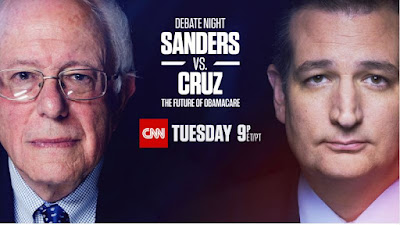Minda Wilson , Author of Urgent Care response on the CNN debate
"If the debate taught us one thing, we learned that both participants come from very different philosophical points of view, are very passionate about what they believe and don't let the facts get in the way of their positions.
In the hair splitting department, Bernie Sanders believes that healthcare is a right, while Ted Cruz believes healthcare access is the right of all Americans.
Because healthcare is a right, Sanders expects the government to absorb the cost of providing it, no matter how great the financial burden would be. While Sanders expects the top 1% of the country to pay for it, he sees himself as a part of that group. If His income as a Congressman puts him in the top 1% of earners. If he doesn't have the money, who does? According to Senator Cruz, if we confiscated all the wealth from the "wealthy" we would not have enough revenue to carry for one year the additional costs of a single payer system which would provide healthcare to all Americans.
According to Ted Cruz, "What we should care about is access to healthcare, not insurance per se. " This means that all people should have access to healthcare, but they still should pay for it themselves. With insurance costing at least $10,000 for a family and deductibles in excess of $5,000, how is the average family going to pay for their care? Cruz thinks that allowing insurance companies to compete across state lines and reducing regulations the insurance companies because they would be making more money, would, out of the goodness of their hearts, pass this increased revenue onto consumers by reducing their prices. This would result in a reduced costs for the family.
Both parties acknowledged our obligation to assist those who need help. Agreement at last. They also agreed that it is insurance companies and drug companies that are the bad actors in the story of escalating healthcare costs. Both acknowledged that drug companies are not required to negotiate prices. It was Ted Cruz who reminded us that, since the passage of Obamacare, health insurance profits have doubled and their margins have dramatically increased. This means that the margins on each policy sold were greater than before Obamacare was passed. However, when it came to tackling the problem of rising costs, both looked to the uncontrolled insurance companies to provide us with a solution. Neither proposed any controls on costs.
Gruber, in his post-debate interview said, the problem with Obamacare was that insurance companies were not given the protections they wanted in order to participate in that market. Both Senators Cruz and Sanders would think this is ridiculous. Bernie thought insurance company executives were making enough money and didn't need more. It was Cruz and his Republicans that voted against releasing an addition $7plus billion dollars to insurance companies to cover losses on Obamacare policies when those same companies were experiencing record profits.
What they didn't talk about was how the position each was advocating for had already failed. In Congressman Sanders own state of Vermont, a single payor system was tried. The system worked so badly and ended up costing so much that less than a year after it was enacted, Vermont pulled the plug. They said that based on their one year of experience, state income taxes would have to be raised 10% across the board, for all taxpayers, in order to cover the costs of their single payor plan. A 10% increase in taxes didn't seem to make sense, especially since that would only cover the costs for subsequent years if there were no increases. Cruz's plan, establishing high-risk pools, has also been tried. Since the aids crisis, high-risk pools have been available to allow people with pre-existing conditions to obtain coverage. The problem was that these programs were not free, they still had to pay for their insurance and, people who were seriously ill couldn't afford the premiums, even though they were subsidized.
So, expanding markets, single payor, giving people more choice of carriers, all the proposals that were made are still insurance based products run by insurance companies. If affordability is the key, the only way that is going to happen is to rein in insurance costs. This will only happen if we regulate the percentage administrative costs allowed by subtracting from the premium dollars received the money paid for medical expenses and services rendered (money in minus money out).
What came out of this is proof that neither Ted Cruz nor Bernie Sanders are familiar with the laws they have already passed. A woman asked the question about what would happen to pregnancy and newborn coverage if Obamacare was repealed? Sanders said she would be uncovered if Obamacare was repealed. Cruz was simply silent. The answer is that women and children already are covered if they are unable to obtain coverage because they can't afford it. We already had legislation on the books. In 1997, Edward Kennedy and Orin Hatch, the odd couple of healthcare, worked together to pass the Children's Health Insurance Program, administered by the United States Department of Health and Human Services. For families with incomes that are modest but too high to qualify for Medicaid, the CHIPs program provides coverage for pregnant women who do not already have pregnancy coverage as well as coverage for uninsured children in families. For those whose qualify for Medicaid, pregnancy is automatically covered, as is coverage for any children born of Medicaid recipients.The reason that proposing a solution is so hard is that emotion, philosophical bias, and lack of familiarity with the facts keeps getting in the way."
Minda Wilson
Author of Urgent Care
Follow me Minda Wilson on:
Twitter: https://twitter.com/_mindawilson
Facebook: https://www.facebook.com/MindaWilsonUSA
Instagram: https://www.instagram.com/mindawilsonusa/


No comments:
Post a Comment